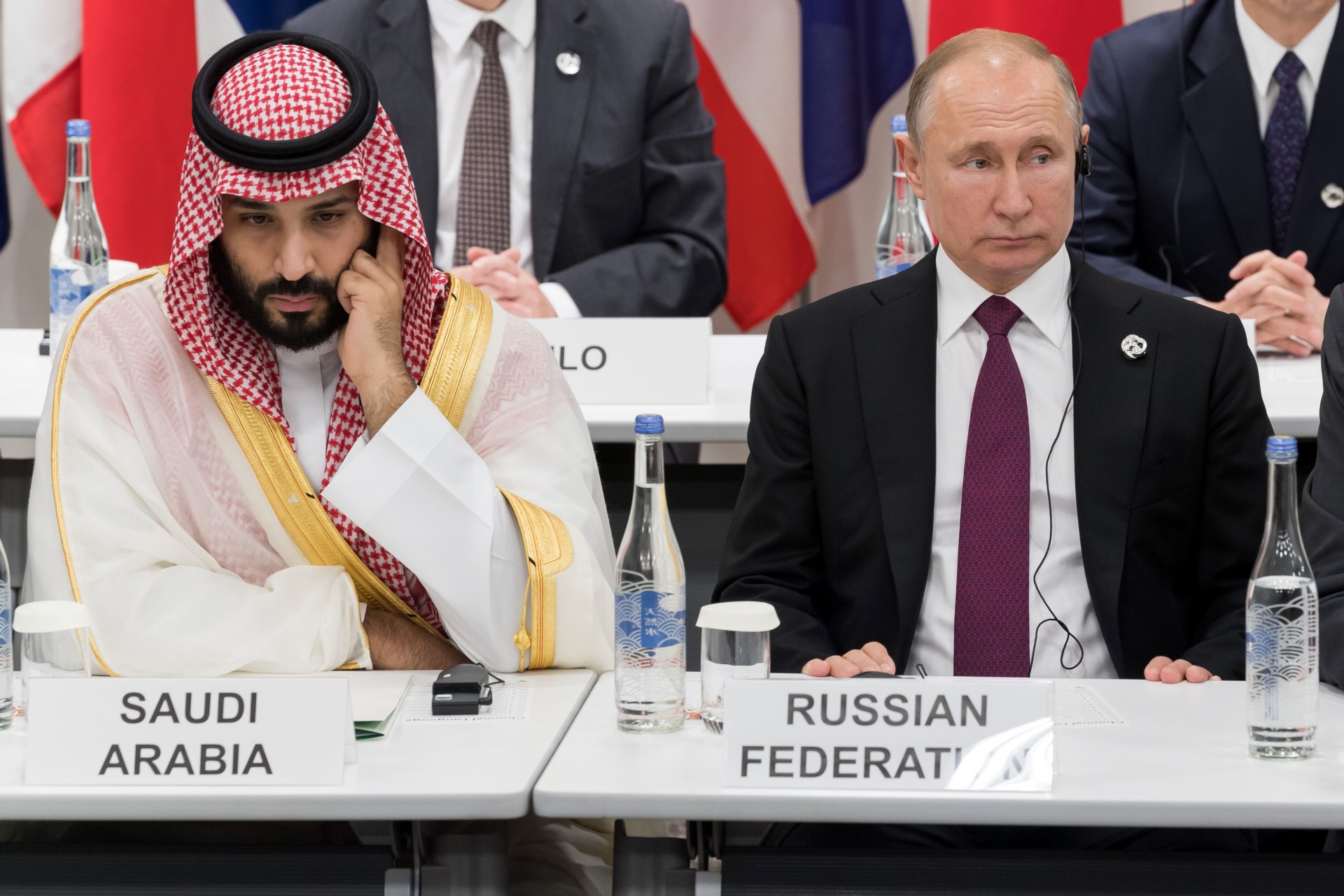Oil isn’t dead. Its demise as a strategic commodity — like the decline in the Kingdom of Saudi Arabia’s power of price and in the Middle East’s strategic relevance — has been greatly exaggerated.
A decade ago, American energy companies began to explore for and extract unconventional oil. They then pumped, piped, trucked, and shipped that oil throughout the United States. Since then, American strategists, policymakers, and analysts have underestimated and misunderstood oil’s relevance. They behaved as if oil ceased being a global, fungible, and vital commodity. They carried out problematic and premature pivots away from Arab allies in the Middle East and toward Asia.
Since beginning a war by, with, and over oil in 2020, the Saudis and the Russians have driven the greatest price drops in nearly a quarter century. U.S.-based producers, like others around the world, are now caught in the crossfire and suffering through the consequences of COVID-19 concerns and a global shutdown. Against that backdrop, American policymakers must move immediately to counter the consequences of this price war, explore mediation, and rethink oil’s relevance as a strategic commodity.
Oil Prices Won’t Recover or Rise Soon
In March 2020, Saudi Arabia and Russia stumbled into a struggle over oil. During a meeting of the Organization of Petroleum Exporting Countries (OPEC) member states and other states who’ve aligned their policies with the organization since 2017, the Saudis and others moved to slash supply for the rest of 2020, believing that they could counter the consequences of oversupply, declining demand, and the slowdowns caused by COVID-19. The Russians refused, and the Saudis cut prices, pumped more oil, released stored crude, offered their customers deals, and announced they’d be unleashing more crude after April 2020. Oil prices plummeted, then plummeted some more.
Prices won’t rise soon, for at least three reasons: collective supply increases, declined demand, and a global glut. First, the Saudis will continue their campaign in the oil market as they’ve done in other spheres recently: punitively and persistently, while extracting ancillary benefits and undercutting adversaries despite muddled long-term prospects for their policy. Second, demand is down, declining, and likely to decline more. Third, the existing global glut will get worse.
Conflict’s Consequences: Saudis Will Suffer as Others Suffer More
The Saudis will struggle. They’ll try to keep the price below $30 per barrel for the foreseeable future. Indeed, they’re already pricing some of their crude at $25, or $20 per barrel. (They’re trying to encourage European and Asian refiners, for instance, to stop using Russian crude.) With lower prices, they’ll have to use other resources to meet their various obligations. They may also stop or slow the transformation of the Saudi state, state-owned entities, economy, and society through various visions, schemes, and plans for the future. Even so, royals in Riyadh have assessed, perhaps after initiating the price war, that they can punish their adversaries more than their adversaries can punish them. Moreover, the Kingdom has about $500 billion in cash, savings to spend, assets to exploit, and the credit and credibility to borrow more money. The Saudis will survive, although their longer-term prospects depend on more than this campaign.
Russian producers cannot compete commercially, technically, or financially. (Moreover, unlike their American and Arab competitors, they must deal with customers who are skittish about the financial and sectoral sanctions that the United States, European Union, and others have applied since the Russians launched their war in Ukraine.) Russian producers can adapt to prices in the $30-$40 range, but they must operate more efficiently to do well in the long run and the state may require prices of at least $40 per barrel to balance its books. More broadly, the Russian state may divert resources to support the sector and may be able to manipulate its currency to mitigate the pain. Russian producers will try to hang on until they and the Saudis can settle on something that they, and their respective political superiors, don’t see as capitulation.
America is more complex. For starters, none of the energy companies based in the United States are state-owned enterprises. American producers also differ from each other a great deal. They pursue different opportunities and enjoy different advantages, just as they try to manage certain risks and struggle with specific vulnerabilities: technology, land rights, regulatory permits, services relationships, offtake agreements, reputation, and more. Most U.S. producers will struggle with persistent low prices. They can’t immediately cut production, mothball facilities, or stop upstream activity to counter Saudi moves or even to avoid losses. (For various reasons, they may need as many as eight months to do so.) Therefore, they must keep alive activities that aggravate their own losses and oversupply in the market. While they’ve adapted in the past and been more resilient, dogged, and savvy than the Saudis assessed during a price war five years ago, most U.S.-based producers will nonetheless struggle with prices below $50 or maybe $40 per barrel.
Others will be caught in the crossfire. State-owned or state-supported producers, be they aligned with American allies or adversaries, can’t compete with the Saudis. They may still pump and release more crude — some to bandwagon, others to blast back. Consuming companies or states may benefit in a narrow sense, though they may suffer countervailing consequences like reduced remittances or investments. Moreover, neither producers nor consumers will gain as much as they did in the past from the sort of stimulus brought on by cheaper crude given current conditions — from COVID-19, to market collapses, to economic crises — around the world.
Oil’s Relevance and America’s Policy Predicaments
Over the past decade, American strategists, policymakers, and analysts have misunderstood and underestimated oil’s importance. While they’ve assessed correctly that American society would benefit from unleashed North American crude, they erred in assessing — or hoping — that they could move away from the Middle East when it came to energy and statecraft. Arming themselves with energy efficiency, and then autonomy, American officials dreamed of everything from total energy independence and geopolitical transformation to protectionist policies and export-oriented initiatives. Over time, they began to see certain Arab allies as less important and, in turn, began to believe they could pivot away from them and downgrade relationships already fraught with the political, commercial, and social tensions that sometimes cloud strategic sight.
The Obama administration tried to execute parallel pivots within and away from the Middle East, although not solely because of energy autonomy. It turned away from Arab allies in the area while turning toward Asia — only to lurch back, then struggle with the 2011 Arab Spring generally and the Syrian war specifically. Then, the Trump administration amplified aspects of problematic policies: for instance, engaging in counterterrorism operations against Sunni Islamist extremists without crafting a strategy to address the political environments in which radicals rise. For good measure, team Trump has added a punitive disposition and nakedly narrow, negative transactional sense of the American interest that makes it difficult for Arab leaders and peoples to trust — and thus fully work with — the United States in the long run.
Of course, American administrations have scored some successes: targeted strikes, tailored sanctions, and special operations that have eliminated or constrained adversaries in the area. And yes, American and Arab leaders have cooperated in the strategic sphere: basing, access, force development and reorganization; overt and covert campaigns around the Middle East; and intermittent and inconsistent initiatives to counter Iran, the Syrian regime, and radicals in the region. But they’ve never truly rebuilt a political partnership that has been suffering since the Sept. 11 terrorist attacks and the decades of strategic schizophrenia in their respective capitals. They will need that partnership to pursue their interests in the future, in part because no substitute or set of substitutes will soon replace the barrel of oil in militaries, economies, and societies around the world.
U.S. Policymakers in the Current Context
American policymakers may need to make virtues out of realities. Although they can’t control oil markets or immediately influence the behavior of American allies, partners, and adversaries waging this war, U.S. officials may adjust on a few fronts immediately, exploit lower prices in 2020, and — bearing in mind competing and complex geopolitical and commercial interests — rethink the relevance of oil in the long term.
For starters, U.S. officials must suspend any and all regular sales from the strategic petroleum reserve. After that, U.S. officials must buy oil to replenish the reserve, where — despite some technical and maintenance challenges — they can now store at least 90 million more barrels of oil, by adding up to 2 million barrels a day. (They’ve already suspended some sales scheduled in February 2020 and arranged to purchase crude, which indicates the administration has adjusted well on this issue thus far.) They could also consider interim arrangements with companies to purchase more crude in 2020, while they improve and expand the reserve. By buying significant amounts of oil on the cheap, the U.S. government may avoid contributing to oversupply, help producers recover some value and reorganize, and build a national-security stockpile destined to seem irrelevant until the day it is indispensable.
From there, U.S. officials could try to broker a deal between OPEC and non-OPEC producers — working alone, or alongside North American allies and partners who’ve already offered to work on the issue. Unilaterally, they may coax partners like the Saudis and Emiratis to ease back toward production levels that settle prices in a more prudent range (accounting for American producers while nonetheless denying sovereign adversaries revenues at higher price points linked to their state’s fiscal and political, as opposed to corporate or project, break-even points). If they determine, based on a balance of geopolitical, sectoral, and consumer considerations, that they must do more, U.S. officials may bolster bureaucratic and back-channel capabilities. They could empower an envoy for energy diplomacy, who may work on this price war abroad; cooperate with regional and thematic bureaus in the U.S. departments of State, Defense, and Energy at home; and resurrect America’s role on energy issues in Europe, the Caucasus, the Mediterranean, Central Africa, and elsewhere.
Above all, American strategists and officials must rethink the relevance of oil and what that means for their vision, strategy, and policies toward the Middle East. Oil and Arab states didn’t disappear when the Bakken boom began; their strategic relevance didn’t evaporate, either. They remain relevant in determining market prices, which in turn shape the prospects of producers in the domestic American market. Moreover, and more important, they remain relevant in determining global production and prices, which affect American and allied economies and societies specifically and our entire contemporary socio-cultural order generally. Were oil a regional or non-fungible commercial product, or were the United States a state without interests around the world, American strategists might’ve actually been able to translate energy autonomy — newfound, fragile, and perhaps impermanent — into strategic autarky. Leading alliances and orchestrating order in the world, however, the United States must remain engaged in any area — above all, the Middle East — that is important for the production and free flow of that oil.
From that baseline, American strategists and officials may wish to reconsider the past decade’s policies. Re-engaging Arab states and societies more comprehensively, American leaders may rebuild political partnerships in the Middle East while restoring their understanding of oil as a global, fungible, and vital commodity — not a local, regional, or continental commercial product — that will require their intimate involvement in the Middle East and indeed around the world.
Anthony Elghossain is a lawyer, writer, and non-resident scholar at the Middle East Institute. His book, “They Came in Peace,” is due out in 2021. He tweets at @aelghossain.
The views expressed in this article are those of the author and not an official policy or position of the Newlines Institute.






